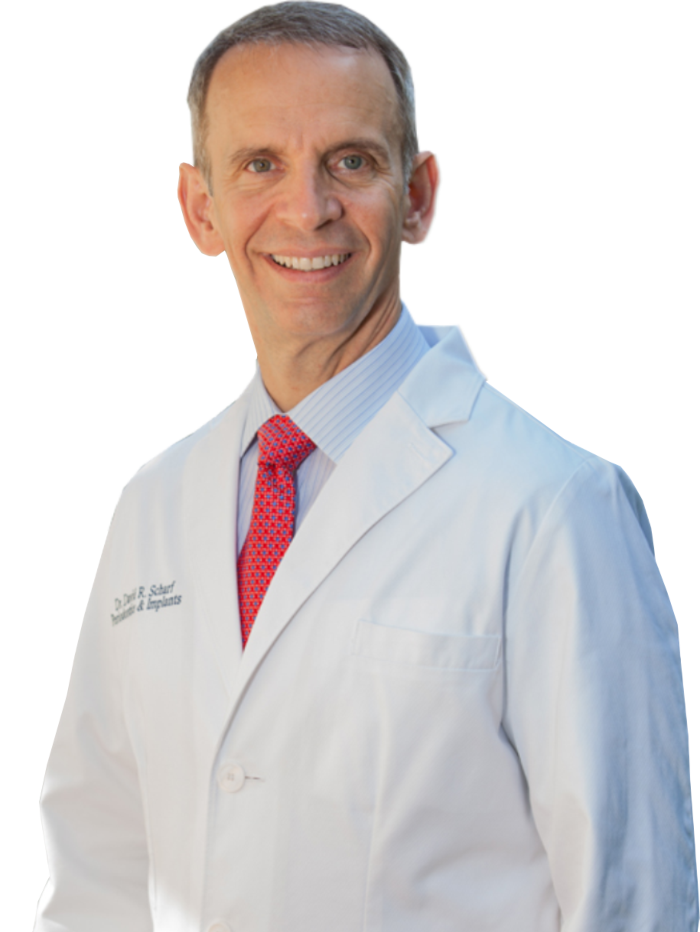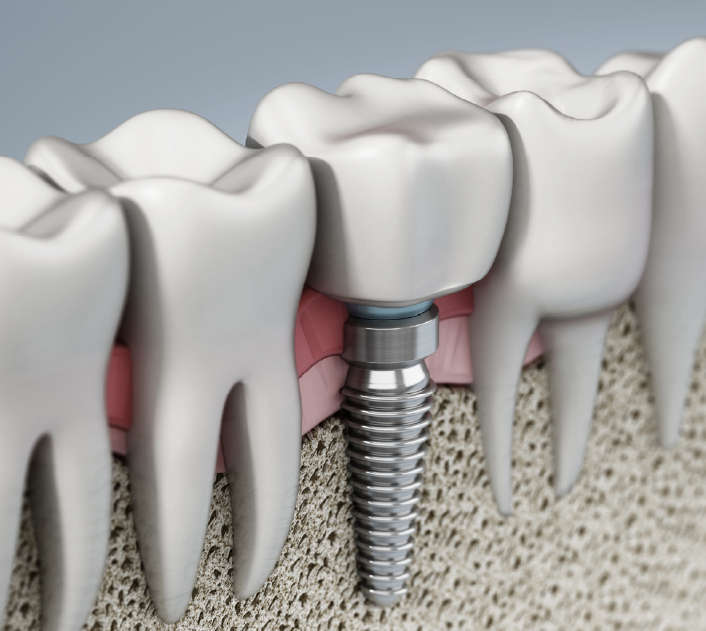
Dental Implants
Recovery and Care FAQ
Click above to see reviews.

Dr. Scharf will give you more details about your dental implant surgery when you visit him — what to expect, how to take care of them, etc. Here we address some common questions and concerns. Also, feel free to call with questions.

What factors might add to recovery time?
In an ideal situation, Dr. Scharf can place an implant without making an incision and load a temporary crown immediately. This almost eliminates downtime. But often, other factors come into play. Recovery time is affected by the number and location of the implants. If you need a bone or soft tissue graft it could take longer. Incisions in areas where teeth have been missing for a while will need time to heal.
How do I take care of my implants while they are healing?
It is critical to maintain good oral hygiene while you are recovering. During the first 24 hours after the procedure, it may be helpful to rinse out your mouth with a warm salt water solution. (Do not use mouthwash or peroxide rinse.) After 24 hours have passed, you can begin gently brushing your teeth again. Take any medications that have been prescribed to you as directed.


How much pain will I feel?
For most implants, the pain is far less than you might expect from surgery. Typically it requires only a small incision in the gums. Since bone has no nerve endings, this will create no pain. Depending on the invasiveness of your procedure, you may be given a prescription pain relief medication. If you are not prescribed pain medications, you may take an over-the-counter analgesic such as ibuprofen (Advil) or acetaminophen (Tylenol) as needed. After a day or so, there should be no pain.
What can I eat, and when?
An hour after surgery, you can remove the first set of gauze and have something soft to eat. Avoid hot liquids or drinking from a straw for the first 24 hours. After the first day you can move on to firmer foods, but let your comfort level be your guide. Do not eat anything that causes pain while you recover.
What can I expect during the healing process?
Some soreness and tenderness are common, but it should continue to feel better with each passing day. If the pain becomes increasingly worse, please call us. Swelling can also occur on the face near the surgical site and will ease over two or three days. Ice applied to the face and an anti-inflammatory drug (such as ibuprofen) can help decrease any swelling and discomfort. You may have a slight temperature following the procedure, but it should not exceed 101.5°F. If this occurs, please call us. You may experience some dizziness or nausea due to the medications or swallowing blood. This is normal and should subside within 24 hours after cessation of those medications.
How long will it take to fully recover?
There are many factors that contribute to the recovery period for dental implant surgery. If you only receive one or two implants and did not receive bone or tissue grafts, recovery can take as little as 1-2 weeks, but full integration takes 3 to 6 months. If you receive many dental implants and need any gum grafts, the gum recovery can take 2-3 weeks, and full integration is 3-6 months, sometimes up to 8 months. Other considerations are age, health, and hygiene.
When can I resume regular activity?
Some patients are able to return to work the same day as their surgery. Others may need to take a day or two to recuperate. We recommend not driving while the anesthesia wears off until you see what kind of pain you’re dealing with. Beyond that, do what you feel comfortable doing. Please avoid any strenuous activity until 3 days have passed and you are no longer taking any narcotic medications.
Is it okay to smoke after receiving dental implants?
Along with the normal health problems that arise from tobacco, it can be detrimental to the healing process after receiving dental implants. Smoking can lead to infection and implant failure. At least for the week following your implant surgery, avoid smoking and the use of chewing tobacco.
When will I receive my permanent crowns?
When you leave the office, you will likely have temporary crowns that will act as regular teeth until you receive your permanent crowns or caps. This usually takes place 4-6 months after surgery to fully heal. However, if your procedure was minimally invasive, you may receive your permanent crowns much sooner. In some cases, patients receive their permanent crowns on the day of surgery.
How do I take care of my dental implants after they are healed?
Your dental implants function the very same way as your natural teeth. It is important to brush, floss and rinse, and to see your dentist regularly for check-ups and cleaning. While you won’t get cavities in your dental implants, they are susceptible to regular wear and tear, so the better care you give them, the longer they will last and the stronger they will be. It is also important to take good care of the gum tissue surrounding your implants, as the health of your gums has a direct effect on the health and strength of the supporting jaw bones.
Here at Dr. Scharf’s office, we want the best for you and your teeth. We believe that by educating our patients you will be able to make the best decisions about your health and be happy with the outcome. When we work with our patients to understand their needs and effectively treat them the results are extraordinary. Let us help you reach your goal of having strong, beautiful teeth.
Schedule a consultation to discuss your options and let us help you on your way to your perfect smile.
Long Island Dental Implants
ADDRESS:
98 East Main Street
Babylon, NY 11702
Get Directions
PHONE: (631) 661-6633
OFFICE HOURS:
- Monday: 11:00 AM to 8:00 PM
- Tuesday: 9:00 AM to 8:00 PM
- Wednesday: 8:00 AM to 5:00 PM
- Thursday: 8:00 AM to 5:00 PM
- Friday: 8:00 AM to 5:00 PM
